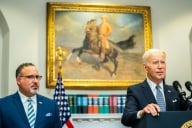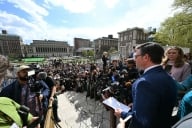You have /5 articles left.
Sign up for a free account or log in.
A federal appeals court on Thursday declined to lift an injunction on President Trump’s ban on travel to the United States from six majority-Muslim nations.
The U.S. Court of Appeals for the Fourth Circuit, in a 10-to-3 ruling, found that the Trump policies amounted to religious discrimination, in violation of the Constitution. Further, the appeals court found that while the president of the United States has broad powers related to entry to the country, those powers are not absolute.
Of the president’s travel ban, the court decision called it “an executive order that in text speaks with vague words of national security, but in context drips with religious intolerance, animus and discrimination. Surely the Establishment Clause of the First Amendment yet stands as an untiring sentinel for the protection of one of our most cherished founding principles -- that government shall not establish any religious orthodoxy, or favor or disfavor one religion over another. Congress granted the president broad power to deny entry to aliens, but that power is not absolute. It cannot go unchecked when, as here, the president wields it through an executive edict that stands to cause irreparable harm to individuals across this nation.”
The case is expected to go to the U.S. Supreme Court.
The current version of the ban, which the government has been blocked from implementing, contains some modifications from an earlier version, which was also rejected by courts. The current version applies to people coming to the United States from Iran, Libya, Somalia, Sudan, Syria and Yemen, and includes those coming for educational purposes.
More than 15,000 students and more than 2,000 visiting scholars came to U.S. universities from the six nations named in the current version of the ban in 2015-16, according to data from the Institute of International Education. While they make up only a small share of international students and scholars in the United States, leaders of academic groups have been united in condemning the travel ban. Many say it has had an impact on the image of the United States with international students (or potential students) all over the world, not just in those countries covered by the ban.
The Middle East Studies Association, a scholarly group, is one of the plaintiffs in the case decided today by the Fourth Circuit. The association’s president, Beth Baron, a professor at the City University of New York’s Graduate Center, said in a statement that the Fourth Circuit’s ruling “reaffirmed what MESA and our partners in this lawsuit have been saying from the beginning: President Trump’s Muslim ban violates the U.S. Constitution. We are thrilled that the court upheld the Constitution’s prohibition on actions disfavoring or condemning any religion, for that principle is a fundamental protection for all of us -- including MESA members.”
“Today’s decision will allow MESA to move forward more freely in advancing our mission as a scholarly association -- to facilitate the free exchange of ideas,” Baron said. “The order has already harmed our student and faculty members by preventing travel and disrupting research. We hope today’s legal victory will mitigate this disruption.”
The other plaintiffs include refugee resettlement organizations -- in addition to the ban on entry for nationals of the six countries, Trump’s executive order also suspended all refugee admission -- and six individuals who allege that Trump’s executive order would impact the ability of their immediate family members to obtain visas or enter the U.S. as refugees. One of the plaintiffs, identified only as Jane Doe No. 2, is described in the opinion as a college student who has a pending visa application on behalf of her sister, a Syrian refugee living in Saudi Arabia.
Another, identified as John Doe No. 1, is a scientist with lawful permanent residency status who has filed a visa application on behalf of his wife, an Iranian national. The opinion quotes John Doe No. 1, who is Muslim, as saying that the ban “forces [him] to choose between [his] career and being with [his] wife.”








